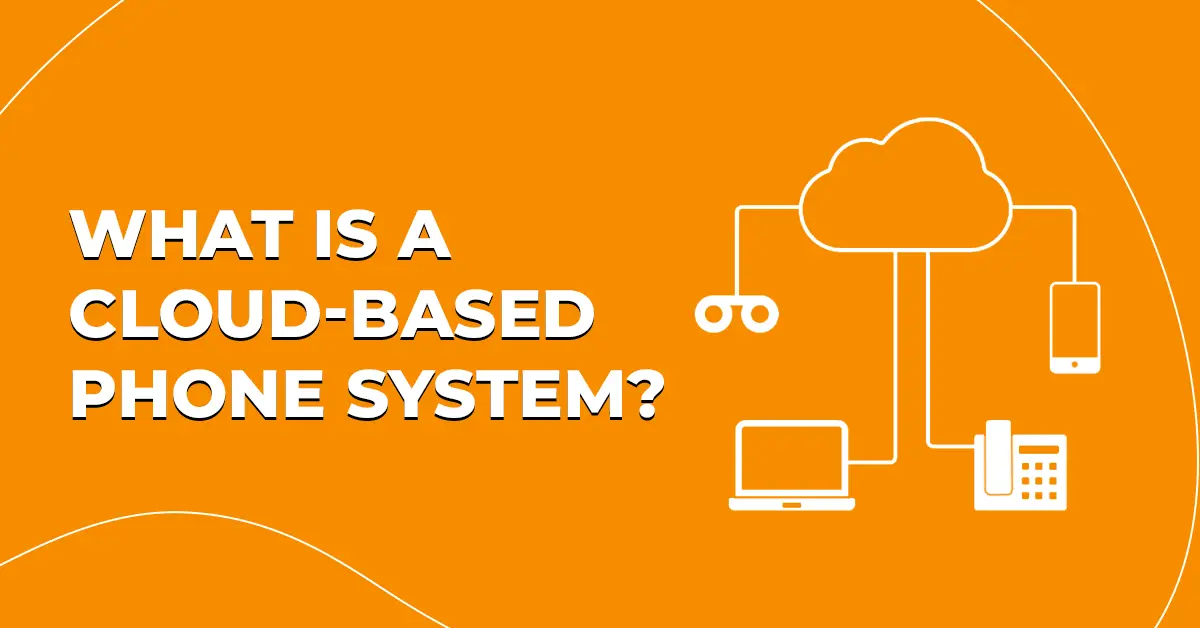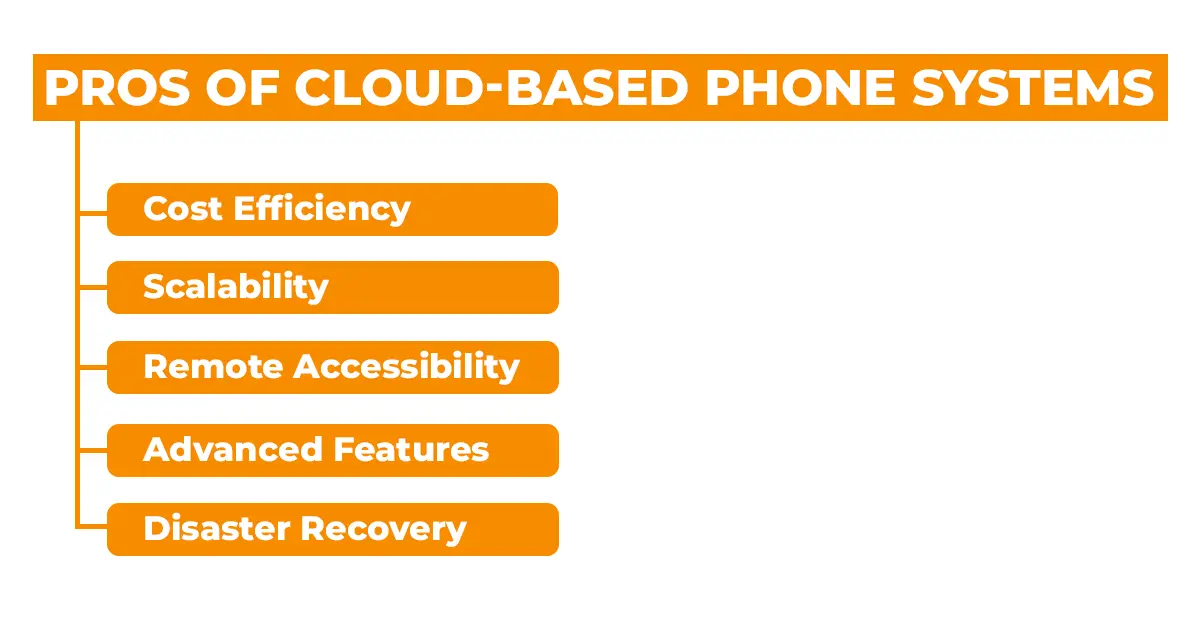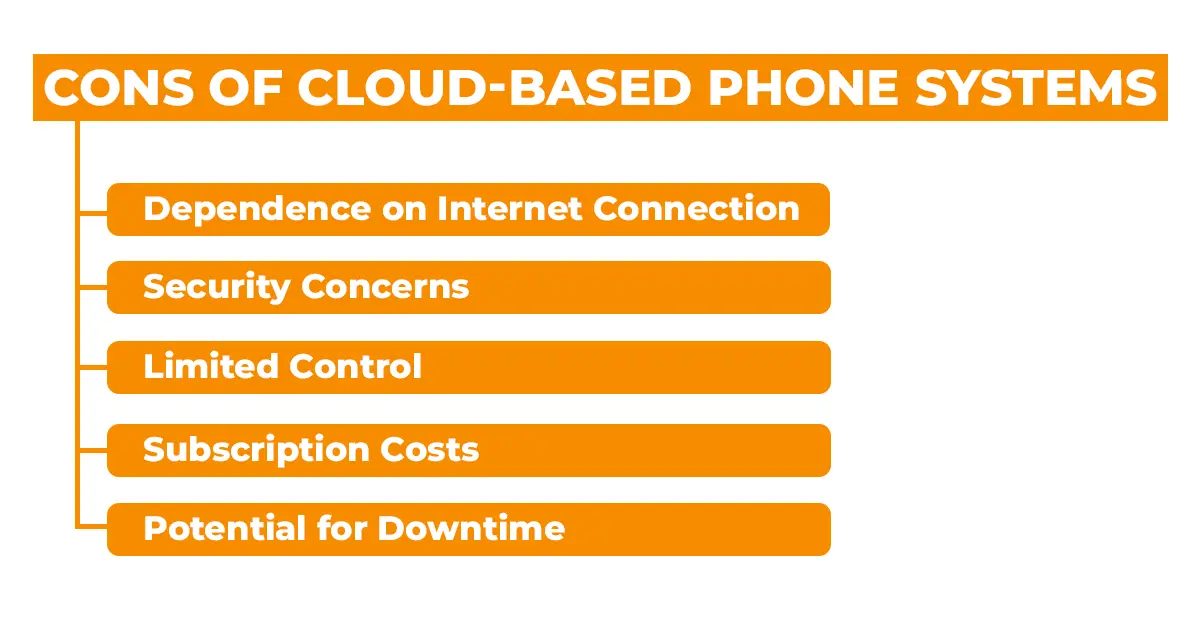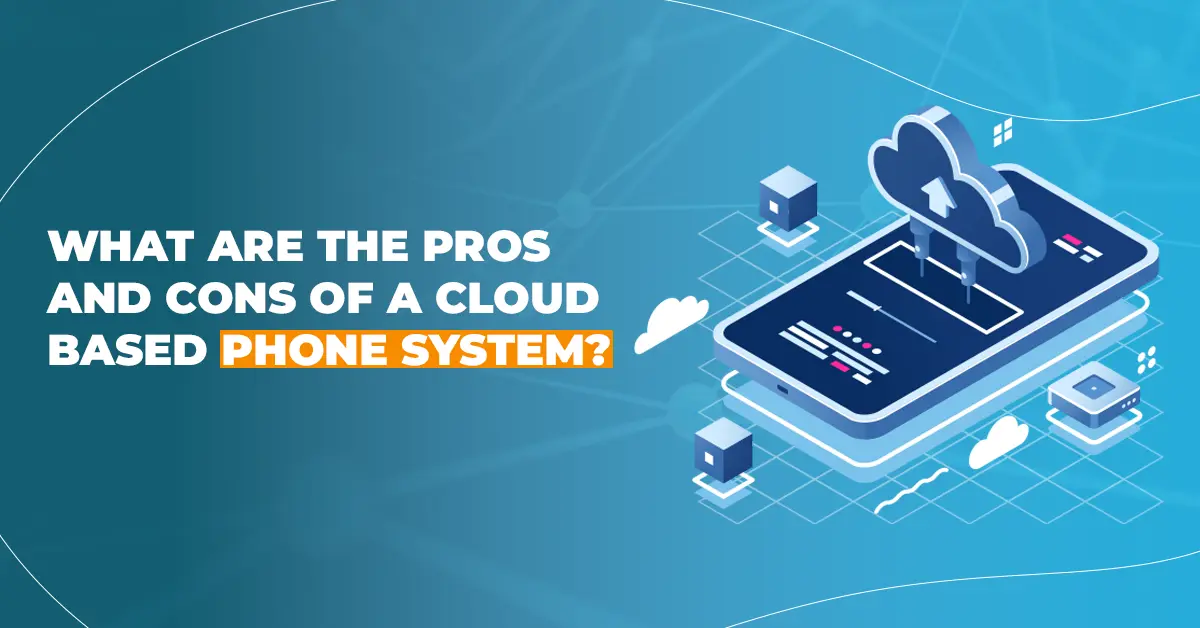In modern business landscape, effective communication is a cornerstone for success in the modern business landscape. Connecting seamlessly with clients, partners, and team members is crucial for growth.
Today, most companies are opting for cloud based phone systems over traditional alternatives due to their enhanced effectiveness and fluidity.
Cloud based phone systems have become a popular choice among business owners for their robust features, flexibility, and scalability. But does this solution truly align with your business’s unique needs?
This article will explore the pros and cons of cloud based phone systems in depth and discuss each aspect to provide you with a comprehensive understanding.
However, for those pressed for time, fret not; a table summarizing the pros and cons of cloud based phone systems is also available for quick reference.
| Pros | Cons |
| Cost efficiency: The system is more cost-effective compared to traditional phone systems. | Dependence on Internet connection: The system is fully dependent on the Internet connection, which poses a risk in case of outages. |
| Scalability: Easily adapt to the changing needs of your business, allowing for seamless expansion. | Security Concerns: The reliance on cloud technology raises data security and privacy concerns. |
| Remote accessibility: Users can make and receive calls from anywhere with an internet connection. | Limited Control: Businesses may have less control over customization and configuration compared to on-premises systems. |
| Advanced features: Offers advanced features such as voicemail transcription and call routing. | Subscription Costs: While cost-effective initially, recurring subscription fees can accumulate over time. |
| Disaster Recovery: Data stored in the cloud ensures quick recovery and minimal disruption. | Potential for downtime: Downtime due to technical issues or maintenance can disrupt business operations. |
What Is A Cloud Based Phone System?

A cloud based phone system utilizes VoIP (Voice Over Internet Protocol) technology to facilitate phone calls tailored to modern businesses’ communication needs. Unlike traditional phone systems, cloud based VoIP eliminates the need for hardware or infrastructure, operating solely through an internet connection.
Therefore, businesses rely more on cloud phones than traditional phone systems. Cost-effectiveness, remote accessibility, and advanced features are some of the benefits of cloud based phone systems that allure business owners to use them and enjoy flexible and scalable communication.
Now, let’s delve into a detailed exploration of the pros and cons of cloud based phone systems, examining each aspect to provide a comprehensive understanding of their implications for businesses.
Pros of Cloud Based Phone Systems

Cloud phone systems are constantly enhancing their features, enabling them to be the first choice for most businesses. From providing flexibility to remote work facilities, cloud phones are making it easier for employees to connect.
In this section, we will discuss all the aspects that make cloud based telephone systems alluring for most businesses.
Cost Efficiency:
The cost efficiency of cloud based phone systems is evident compared to traditional telephone systems. Unlike traditional landline setups, which typically cost businesses around $50 per line monthly for local or domestic calls, cloud telephone system plans offer substantial savings, starting at less than $20 per line per month.
These cloud based business phone system plans often include additional features such as international calling and video conferencing at no extra cost.
Scalability:
One of the most important features of a cloud phone system is its scalability, which offers unparalleled flexibility and enables your system to meet your business’s evolving needs.
Where traditional phone systems require costly hardware upgrades or additional lines to accommodate growth, phone systems in the cloud provide a seamless and cost-effective solution.
With cloud based phone systems, scaling up or down is as simple as adjusting subscription plans or adding or removing user accounts. This flexibility allows businesses to respond swiftly to changes in demand, whether due to seasonal fluctuations, business expansion, or workforce adjustments.
For example, a growing company can easily add new phone lines or features to accommodate increasing call volumes without requiring extensive infrastructure investments.
Remote Accessibility:
Remote accessibility is a cornerstone advantage of cloud based phone systems, revolutionizing how businesses communicate. With this technology, users can effortlessly give and accept phone calls from anywhere with an internet connection, transcending geographical barriers and enabling seamless communication regardless of physical proximity.
This flexibility is invaluable in today’s dynamic work environment, where remote work arrangements are increasingly prevalent. Cloud based phone systems empower employees to stay connected and productive, whether working from home, traveling, or at a remote office. This flexibility enhances work-life balance and ensures operations continuity, even in the face of unforeseen disruptions such as natural disasters or pandemics.
Advanced Features:
Cloud based phone systems offer a plethora of features that can create effective and efficient communication within your organization. These systems provide capabilities not typically found in traditional phone systems, enhancing collaboration and productivity.
| Features | Cloud Based Phone Systems | Traditional Phone Systems |
| Automatic call recording | ✔ | ⨯ |
| Voicemail to email or text | ✔ | ⨯ |
| Automatic call forwarding | ✔ | ⨯ |
| Customer caller id | ✔ | ⨯ |
| Multiple attendants | ✔ | ⨯ |
| Call analytics and logs | ✔ | ⨯ |
| Call queues with on-hold music | ✔ | ⨯ |
| Single-click conference calls | ✔ | ⨯ |
Cloud phones clearly have advanced features compared to traditional phone systems. This is one of the major advantages of this communication system.
Disaster Recovery:
Disaster recovery is a crucial advantage of cloud based phone systems, ensuring business continuity despite unforeseen disruptions. Businesses can swiftly recover communications infrastructure after disasters like natural calamities or cyberattacks, with data stored securely in the cloud. This helps minimize downtime and maintain seamless operations.
Cons of Cloud Based Phone Systems

Though the communication system has several pros, no technology is flawless. There are several drawbacks that you might need to keep in mind before choosing this system as your business communication system.
Dependence on Internet Connection:
While cloud based phone systems offer numerous advantages, dependence on an internet connection poses a notable challenge. Reliability hinges on stable internet access, making businesses vulnerable to disruptions during outages. However, proactive measures like redundant connections and network monitoring can mitigate risks and ensure uninterrupted communication.
Security Concerns:
Security concerns represent a significant consideration for cloud based phone systems. Data that are transferred over the internet need to be protected properly or can be vulnerable to breaches. However, reputable providers implement robust encryption and security measures to safeguard sensitive information. It ensures compliance with industry standards and enhances overall system security.
Limited Control:
Limited control is a potential disadvantage of cloud based phone systems. Unlike traditional systems, where businesses fully control hardware and software, cloud systems rely on third-party providers for management and updates. However, this relinquished control often translates to reduced maintenance responsibilities and allows businesses to focus on core operations.
Subscription Costs:
Subscription costs are a consideration for cloud based phone systems. While initial setup expenses may be lower than traditional systems, ongoing subscription fees can accumulate over time. However, these costs typically include maintenance, updates, and support, offering predictable expenses and eliminating surprise charges associated with traditional phone systems.
Potential for Downtime:
The potential for downtime is a concern with cloud based phone systems. While providers strive for high uptime rates, internet outages or technical issues can disrupt service. However, proactive measures such as redundancy and disaster recovery protocols mitigate this risk, ensuring minimal disruption to business operations.
Wrapping Up
Cloud based phone systems offer a wealth of advantages, from cost efficiency and scalability to advanced features and disaster recovery capabilities. Despite potential drawbacks such as dependence on internet connection and security concerns, proactive measures can mitigate risks, ensuring uninterrupted communication.
VoIPElements provide the best cloud phone service. To take your business to the next level contact us now.


